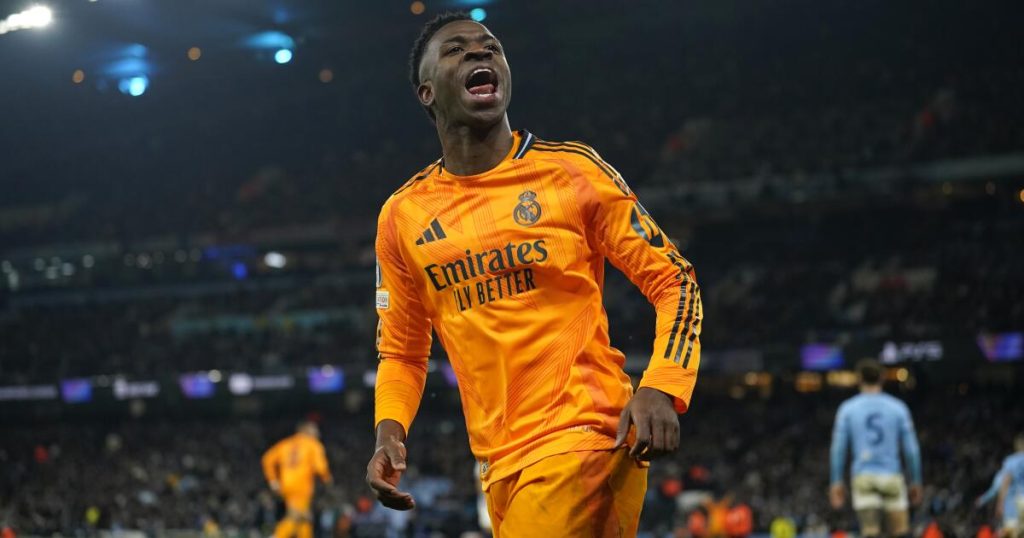On a chilly Tuesday evening in Manchester, the football world witnessed not just a high-stakes Champions League playoff match between Manchester City and Real Madrid, but also a spectacle of rivalry, pride, and a dash of humor. As the two giants of European football prepared to face off, the atmosphere inside the Etihad Stadium was electric, charged with anticipation. However, the spotlight was briefly stolen by an unusual yet symbolic gesture from the Manchester City fans. Unfurled across the stands was a massive banner depicting Rodri Hernández, the City midfielder, kissing the Ballon d’Or trophy. The image was a direct nod to Rodri’s historic achievement last year when he was crowned the best player in the world, edging out Real Madrid’s Vinicius Júnior in the process. The banner also carried a cheeky message in English: “Stop Crying,” a playful reference to a hit song by Manchester’s iconic rock band, Oasis. It was a bold, cheeky statement aimed at Real Madrid and their Brazilian star, Vinicius, who many believed was deserving of the prestigious award.
The reaction to the banner was swift and varied. Real Madrid’s manager, Carlo Ancelotti, was asked about the provocation during his pre-match press conference. The veteran Italian coach, known for his calm demeanor, took the high road. “I don’t know if Vinicius saw it,” Ancelotti said with a shrug. “If he did, it might have been a big motivation for him. But that’s all.” He quickly downplayed the incident, emphasizing that Vinicius was always a threat on the field. Yet, the timing of the banner couldn’t have been more striking, as it came on the heels of renewed discussions about Real Madrid’s decision to boycott the Ballon d’Or ceremony in Paris last October. Ancelotti defended the club’s stance, stating, “We didn’t want to participate because we believed Vinicius should have won the Ballon d’Or. That doesn’t mean we don’t respect Rodri, but we felt Vinicius deserved it last year, not this year.” His words were a clear indication that the debate over the award was far from over.
Meanwhile, Manchester City’s manager, Pep Guardiola, was quick to dismiss any notion of lingering animosity between the two clubs. Guardiola, ever the tactician, focused on the task at hand, downplaying the significance of the banner. “There are no issues between the clubs,” he said succinctly. His player, Ruben Dias, echoed this sentiment. The City defender, who had been alongside Rodri during the Ballon d’Or celebrations, spoke candidly about the situation. “Honestly, I didn’t spend even a second thinking about whether it was disrespectful or not,” Dias admitted. “I was just happy for Rodri. I was there, and I celebrated with him that night.” His words reflected a sense of camaraderie and pride in Rodri’s achievement, rather than any intention to provoke.
Despite the efforts of both managers and players to keep the focus on the game, the banner and the surrounding controversy couldn’t help but dominate the pre-match narrative. For many, it was a lighthearted moment that showcased the passion and banter that make football such a unique and captivating sport. Yet, beneath the humor lay a deeper tension—one that highlighted the fierce competition and high stakes involved. The match itself was a make-or-break moment for both teams, with a place in the Champions League group stages on the line. The added layer of personal pride and rivalry only served to heighten the drama, making the encounter even more unpredictable and thrilling.
The media and fans alike were quick to weigh in on the matter, sparking a lively debate across social platforms and sports channels. Some praised the Manchester City supporters for their creativity and wit, arguing that the banner was a harmless expression of pride and humor. Others criticized it as a taunt that crossed the line, suggesting that it disrespected Vinicius and Real Madrid. For neutrals, it was a reminder of the passion and tribalism that fuel the beautiful game, where every detail—from the players’ performances to the fans’ chants—takes on added significance. Whether one saw the banner as a harmless jest or a provocative jab, it undeniably added an extra layer of intrigue to the occasion.
In the end, the match between Manchester City and Real Madrid was always going to be about more than just football. It was a clash of titans, a battle of egos, and a testament to the enduring appeal of the sport. The banner incident, while minor in the grand scheme of things, became a symbol of the deeper tensions and rivalries that shape the world of football. As the two teams took to the field, the outcome was far from certain, but one thing was clear: the world was watching, and the stakes had never been higher. Whether Vinicius, Rodri, or any other player would emerge as the hero of the night remained to be seen, but the stage was set for a memorable encounter—one that would be remembered as much for the action on the pitch as for the drama off it.
